Unit 8 Have you read Treasure Island yet? Section A 1a-2d 课件(32张PPT,内嵌音频)
文档属性
| 名称 | Unit 8 Have you read Treasure Island yet? Section A 1a-2d 课件(32张PPT,内嵌音频) | 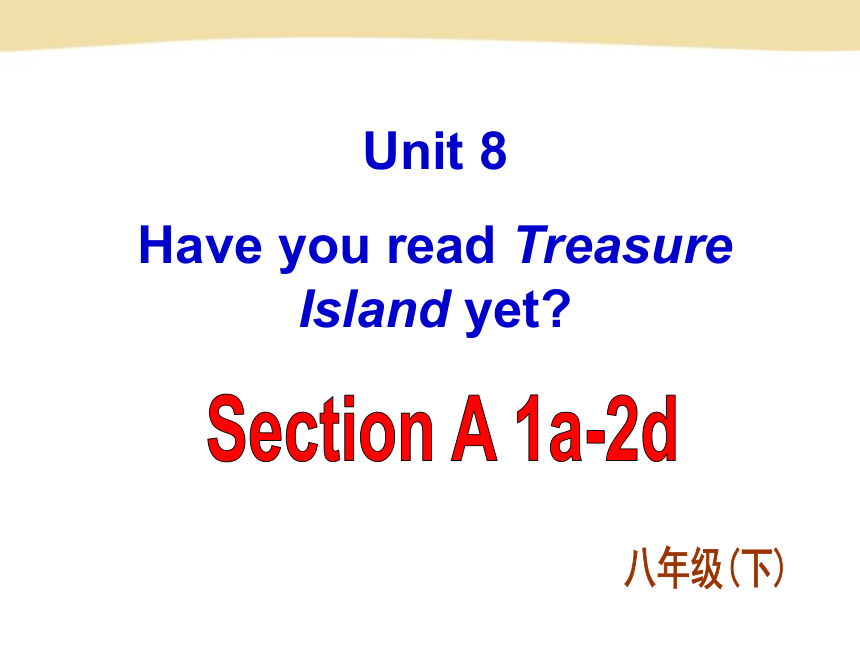 | |
| 格式 | pptx | ||
| 文件大小 | 3.1MB | ||
| 资源类型 | 教案 | ||
| 版本资源 | 人教新目标(Go for it)版 | ||
| 科目 | 英语 | ||
| 更新时间 | 2021-04-28 11:19:27 | ||
图片预览

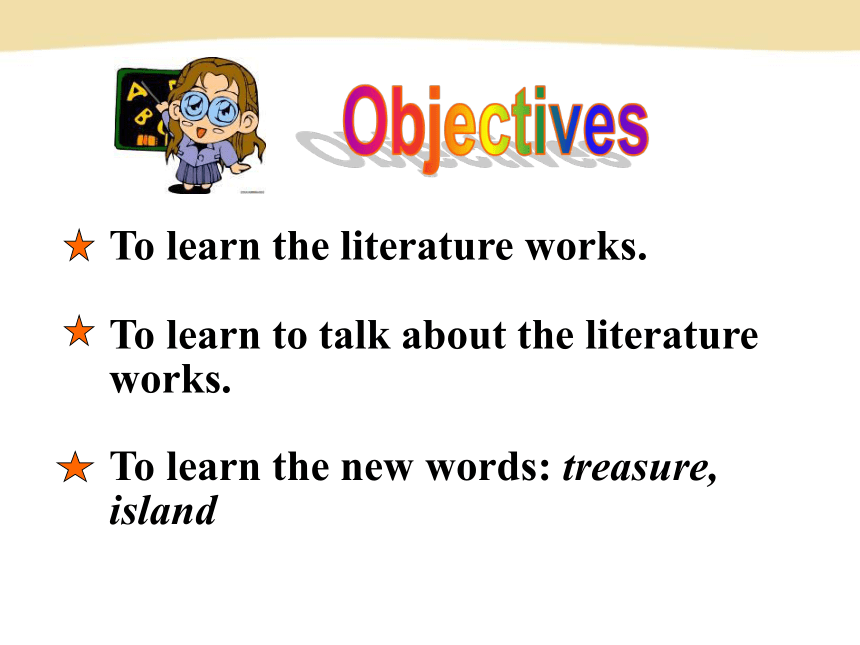
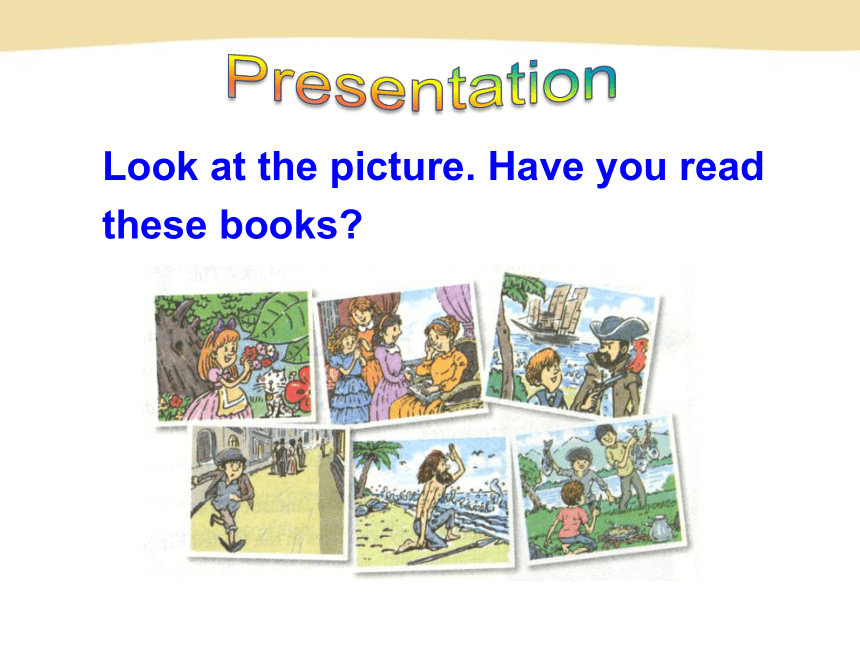
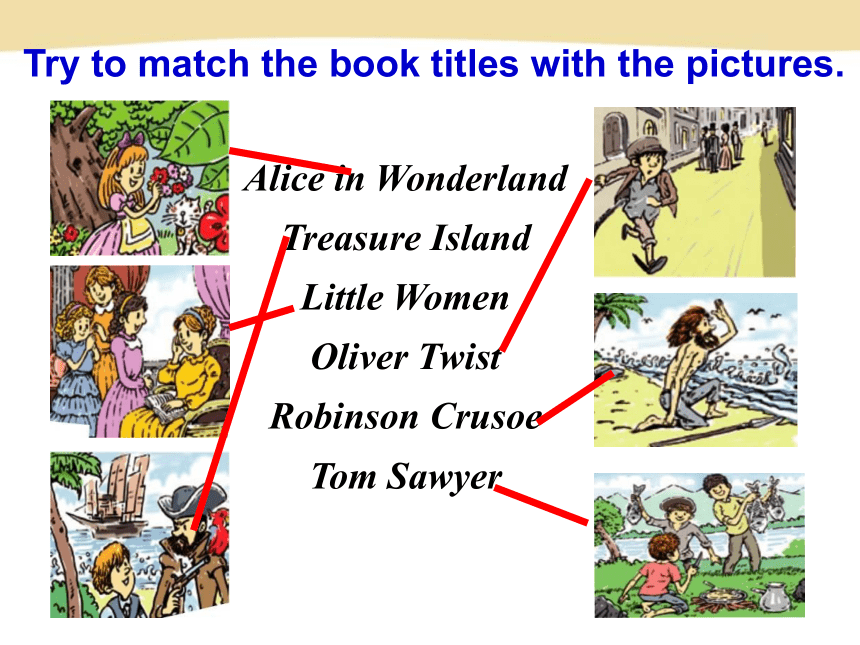
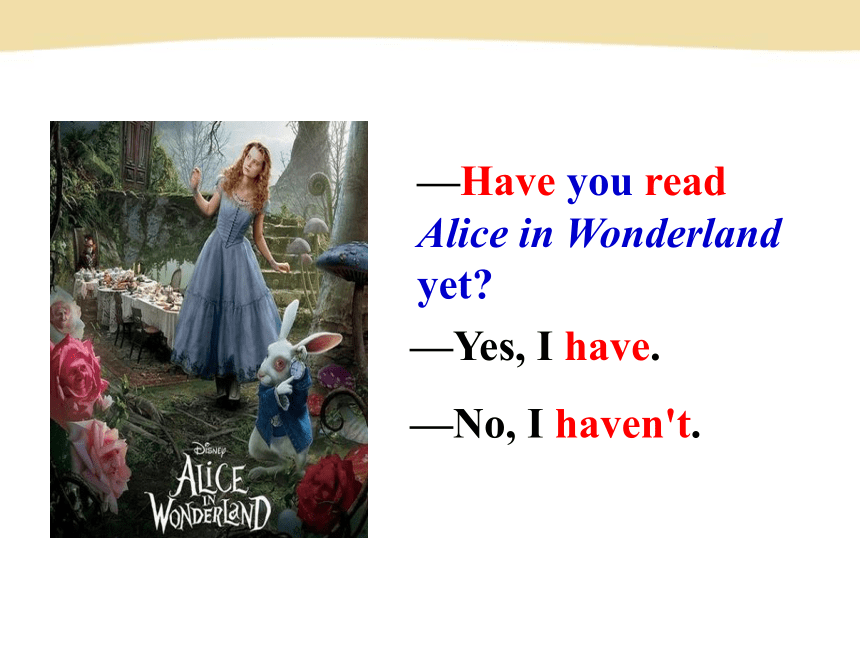
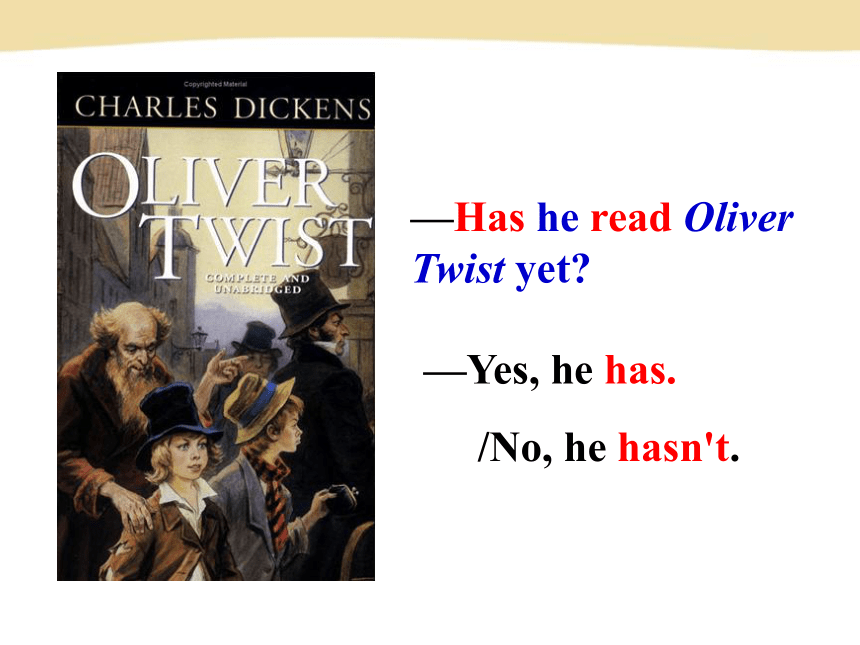
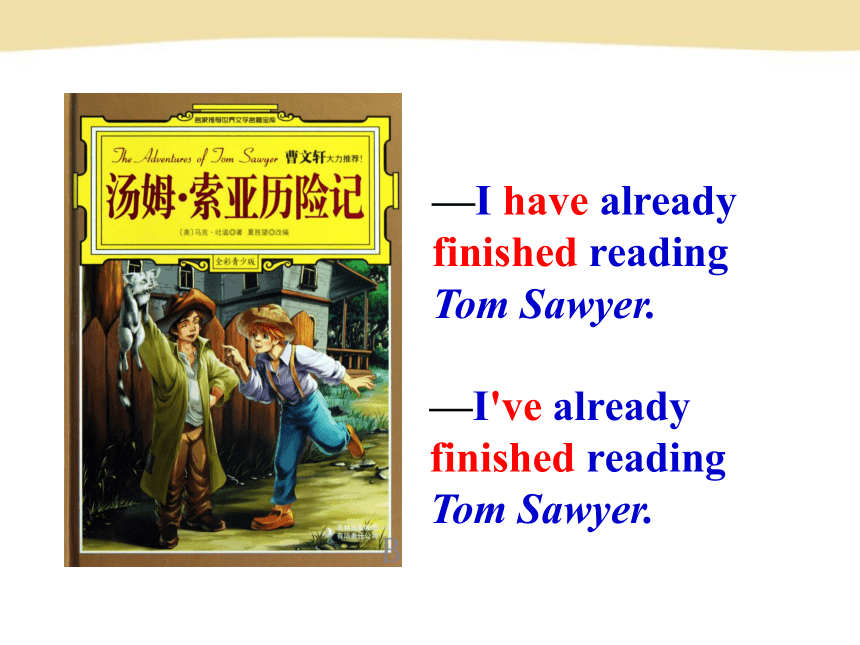
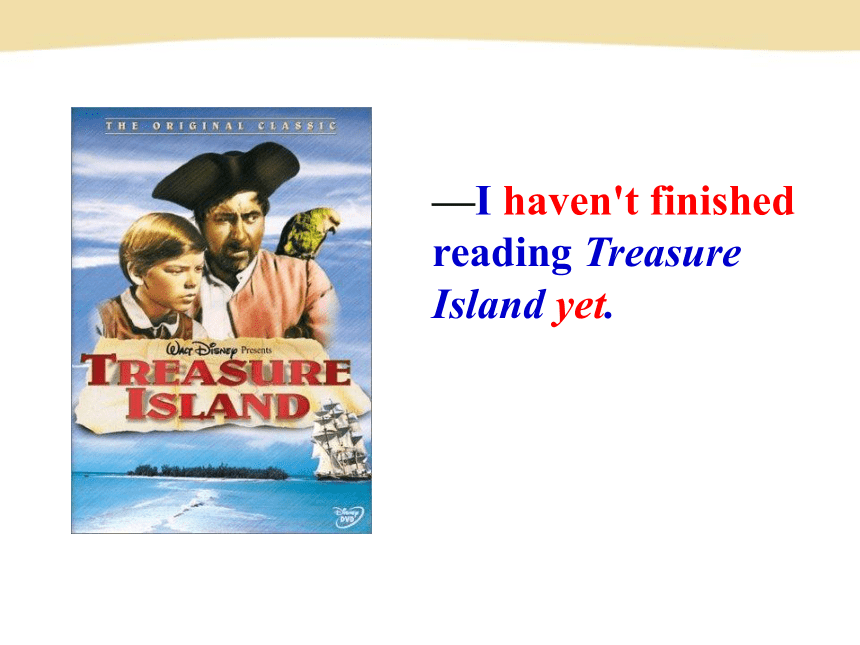
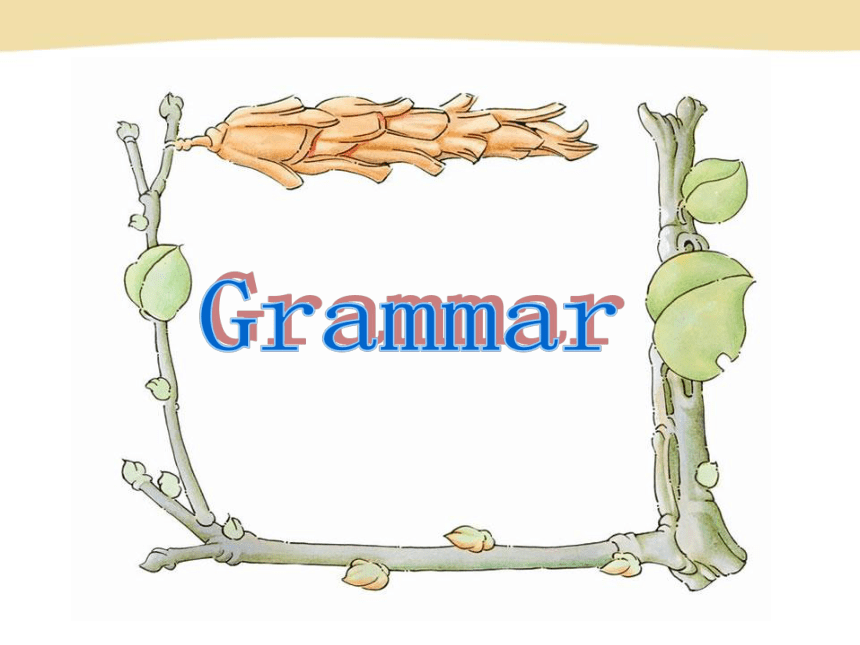
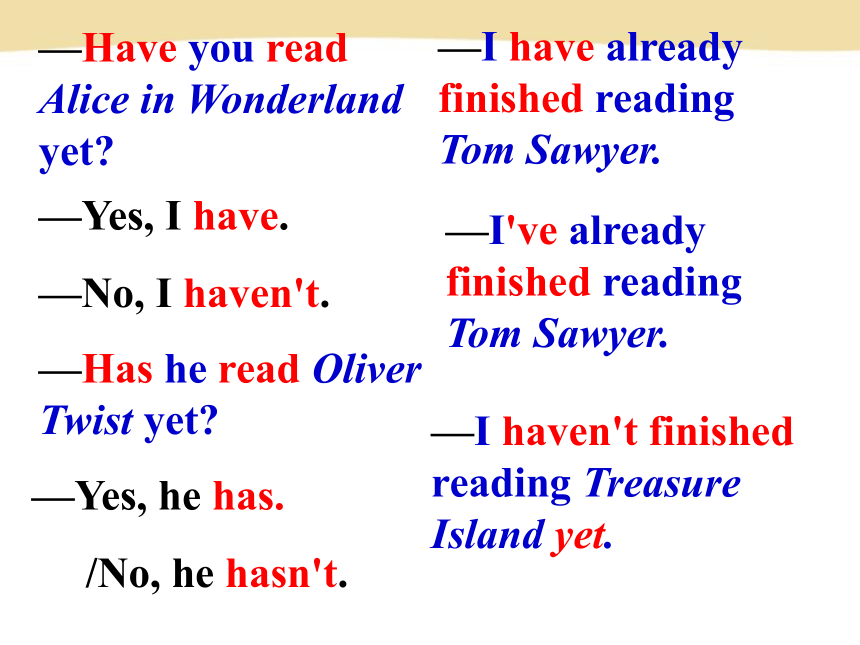
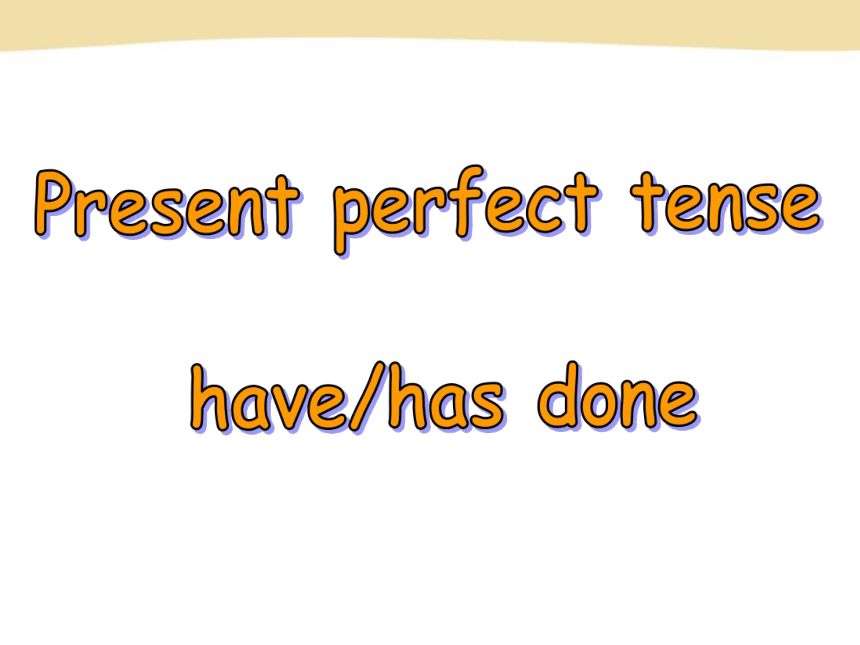
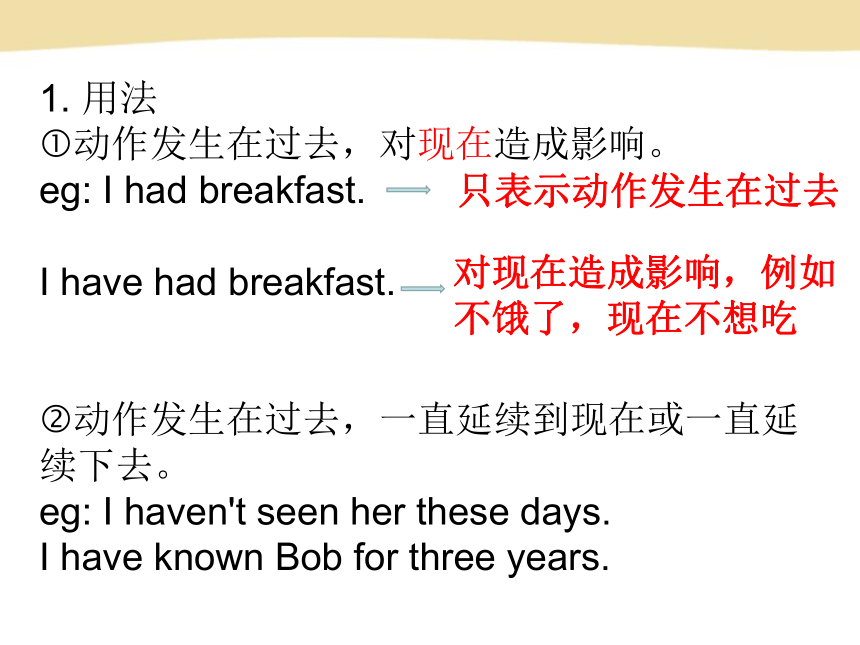
文档简介
Unit 8
Have you read Treasure Island yet?
Section A 1a-2d
八年级(下)
Objectives
To learn the literature works.
To learn to talk about the literature works.
To learn the new words: treasure, island
Presentation
Look at the picture. Have you read these books?
Alice in Wonderland
Treasure Island
Little Women
Oliver Twist
Robinson Crusoe
Tom Sawyer
Try to match the book titles with the pictures.
—Have you read Alice in Wonderland yet?
—Yes, I have.
—No, I haven't.
—Has he read Oliver Twist yet?
—Yes, he has.
/No, he hasn't.
—I have already finished reading Tom Sawyer.
—I've already finished reading Tom Sawyer.
—I haven't finished reading Treasure Island yet.
Grammar
—Have you read Alice in Wonderland yet?
—Yes, I have.
—No, I haven't.
—Has he read Oliver Twist yet?
—Yes, he has.
/No, he hasn't.
—I have already finished reading Tom Sawyer.
—I've already finished reading Tom Sawyer.
—I haven't finished reading Treasure Island yet.
Present perfect tense
have/has done
1. 用法
?动作发生在过去,对现在造成影响。
eg: I had breakfast.
I have had breakfast.
?动作发生在过去,一直延续到现在或一直延续下去。
eg: I haven't seen her these days.
I have known Bob for three years.
只表示动作发生在过去
对现在造成影响,例如不饿了,现在不想吃
2. 构成
主语 + have/has done + 其他.
主语 + have/has not done + 其他.
Have/Has + 主语 + done + 其他?
Wh-疑问句 + have/has + 主语 + done + 其他?
Wh-疑问词 + have/has + done + 其他?
have/has 充当助动词功能
3. 过去分词变化
规则变化:和动词的过去式变化相同
不规则变化:见课本P136-P137
4. 时间状语
?already, yet, just, ever, never, before, so far, in the past, last few years, recently
?for + 一段时间,since + 时间点,since引导的从句,since + 一段时间 + ago
其中:already, never 常用于肯定句
yet 常用于疑问句和否定句
ever 常用于疑问句
already 意为“已经”,常用于肯定句中。
一般置于助动词have/has之后,过去分词之前,但也可放在句末。
e.g. 我已经看过这部电影了。
I have already seen the film.
我已经解决了这个问题。
I have already solved this problem.
我已经做完家庭作业了。
I have finished my homework already.
现在完成时--与already连用
yet,在现在完成时句型中常置于句末。
1) “已经”,常用在疑问句中。
e.g. 琳达已看过这本书了吗?
Has Linda read the book yet?
你完成家庭作业了吗?
Have you finished your homework yet?
2) “还,仍然”,常用于否定句和疑问句。
e.g. 他还未开始工作。
He has not begun to work yet.
现在完成时--与yet连用
just 意为“刚刚”,常用于肯定句中。一般置于助动词have/has之后,过去分词之前。
e.g. 我刚吃过午饭。
I have just finished lunch.
我们刚刚听说她的婚讯。
We have just heard of her marriage.
现在完成时--与just连用
同学们要注意现在完成时与一般过去时的区别。虽然这两个时态都和过去发生的事情有关,但是现在完成时强调这一动作与现在的关系,如对现在产生的结果、影响等,而一般过去时只表示过去的事实,不表示和现在的关系。如:
现在完成时与一般过去时
I went home at 10:00 yesterday. I have got home now.
I have already finished my homework.
I finished my homework an hour ago.
Listen
1b Listen and complete the chart.
Book title
Name
Have they read it?
What do they think of it?
Nick
Judy
Sandy
Alan
Kate
Harry
Treasure Island
No.
Yes.
Exciting
Robinson Crusoe
Yes.
No.
Wonderful
Little Women
No.
Yes.
Fantastic
1. Treasure Island Mark / Tina
2. Oliver Twist Mark / Tina
3. Robinson Crusoe Mark / Tina
4. Tom Sawyer Mark / Tina
2a Listen. Who has read these books? Circle the names.
Oliver Twist is about a boy who goes out to
sea and finds an island full of treasures.
2. Robinson Crusoe is a classic.
3. Tina thinks that Treasure Island is a fantastic
book.
4. Tom Sawyer is about a boy who lives in the
United Kingdom.
2b Listen again and write T for true and F for false.
F
T
T
F
Words
1. treasure: 可数名词:贵重物品
不可数名词:财富,珍宝
动词:珍爱,珍藏
近义词:wealth, fortune, cherish
treasurer: 名词:会计,出纳
treasured: 形容词:珍贵的
priceless treasure: 无价之宝
2. full of: 形容词短语,修饰名词。满是...的,丰富的
eg: The bottle full of water is mine.
be full of = be filled with
3. classic: 可数名词,经典作品,名著
形容词:古典的,典型的
four great classics of ancient China
classic novels/music
4. page
on page + 数字: 第几页
turn to page 20: 翻到20页
5 pages: 5页
5. hurry: 动词:急忙,慌忙
名词:急忙
hurry up: 快点
hurry off: 匆匆离去
hurry to sp:匆忙去某地
hurry to do sth: 匆忙去做某事
do sth in a hurry
be hurried to do sth:
be hurried to sp
6. due: 形容词,预期的,预定的
常做表语:
be due to do sth: 预期做某事
be due for sth
be due in + 一段时间:预定在...
due to: 由于,因为
Thank You!
Have you read Treasure Island yet?
Section A 1a-2d
八年级(下)
Objectives
To learn the literature works.
To learn to talk about the literature works.
To learn the new words: treasure, island
Presentation
Look at the picture. Have you read these books?
Alice in Wonderland
Treasure Island
Little Women
Oliver Twist
Robinson Crusoe
Tom Sawyer
Try to match the book titles with the pictures.
—Have you read Alice in Wonderland yet?
—Yes, I have.
—No, I haven't.
—Has he read Oliver Twist yet?
—Yes, he has.
/No, he hasn't.
—I have already finished reading Tom Sawyer.
—I've already finished reading Tom Sawyer.
—I haven't finished reading Treasure Island yet.
Grammar
—Have you read Alice in Wonderland yet?
—Yes, I have.
—No, I haven't.
—Has he read Oliver Twist yet?
—Yes, he has.
/No, he hasn't.
—I have already finished reading Tom Sawyer.
—I've already finished reading Tom Sawyer.
—I haven't finished reading Treasure Island yet.
Present perfect tense
have/has done
1. 用法
?动作发生在过去,对现在造成影响。
eg: I had breakfast.
I have had breakfast.
?动作发生在过去,一直延续到现在或一直延续下去。
eg: I haven't seen her these days.
I have known Bob for three years.
只表示动作发生在过去
对现在造成影响,例如不饿了,现在不想吃
2. 构成
主语 + have/has done + 其他.
主语 + have/has not done + 其他.
Have/Has + 主语 + done + 其他?
Wh-疑问句 + have/has + 主语 + done + 其他?
Wh-疑问词 + have/has + done + 其他?
have/has 充当助动词功能
3. 过去分词变化
规则变化:和动词的过去式变化相同
不规则变化:见课本P136-P137
4. 时间状语
?already, yet, just, ever, never, before, so far, in the past, last few years, recently
?for + 一段时间,since + 时间点,since引导的从句,since + 一段时间 + ago
其中:already, never 常用于肯定句
yet 常用于疑问句和否定句
ever 常用于疑问句
already 意为“已经”,常用于肯定句中。
一般置于助动词have/has之后,过去分词之前,但也可放在句末。
e.g. 我已经看过这部电影了。
I have already seen the film.
我已经解决了这个问题。
I have already solved this problem.
我已经做完家庭作业了。
I have finished my homework already.
现在完成时--与already连用
yet,在现在完成时句型中常置于句末。
1) “已经”,常用在疑问句中。
e.g. 琳达已看过这本书了吗?
Has Linda read the book yet?
你完成家庭作业了吗?
Have you finished your homework yet?
2) “还,仍然”,常用于否定句和疑问句。
e.g. 他还未开始工作。
He has not begun to work yet.
现在完成时--与yet连用
just 意为“刚刚”,常用于肯定句中。一般置于助动词have/has之后,过去分词之前。
e.g. 我刚吃过午饭。
I have just finished lunch.
我们刚刚听说她的婚讯。
We have just heard of her marriage.
现在完成时--与just连用
同学们要注意现在完成时与一般过去时的区别。虽然这两个时态都和过去发生的事情有关,但是现在完成时强调这一动作与现在的关系,如对现在产生的结果、影响等,而一般过去时只表示过去的事实,不表示和现在的关系。如:
现在完成时与一般过去时
I went home at 10:00 yesterday. I have got home now.
I have already finished my homework.
I finished my homework an hour ago.
Listen
1b Listen and complete the chart.
Book title
Name
Have they read it?
What do they think of it?
Nick
Judy
Sandy
Alan
Kate
Harry
Treasure Island
No.
Yes.
Exciting
Robinson Crusoe
Yes.
No.
Wonderful
Little Women
No.
Yes.
Fantastic
1. Treasure Island Mark / Tina
2. Oliver Twist Mark / Tina
3. Robinson Crusoe Mark / Tina
4. Tom Sawyer Mark / Tina
2a Listen. Who has read these books? Circle the names.
Oliver Twist is about a boy who goes out to
sea and finds an island full of treasures.
2. Robinson Crusoe is a classic.
3. Tina thinks that Treasure Island is a fantastic
book.
4. Tom Sawyer is about a boy who lives in the
United Kingdom.
2b Listen again and write T for true and F for false.
F
T
T
F
Words
1. treasure: 可数名词:贵重物品
不可数名词:财富,珍宝
动词:珍爱,珍藏
近义词:wealth, fortune, cherish
treasurer: 名词:会计,出纳
treasured: 形容词:珍贵的
priceless treasure: 无价之宝
2. full of: 形容词短语,修饰名词。满是...的,丰富的
eg: The bottle full of water is mine.
be full of = be filled with
3. classic: 可数名词,经典作品,名著
形容词:古典的,典型的
four great classics of ancient China
classic novels/music
4. page
on page + 数字: 第几页
turn to page 20: 翻到20页
5 pages: 5页
5. hurry: 动词:急忙,慌忙
名词:急忙
hurry up: 快点
hurry off: 匆匆离去
hurry to sp:匆忙去某地
hurry to do sth: 匆忙去做某事
do sth in a hurry
be hurried to do sth:
be hurried to sp
6. due: 形容词,预期的,预定的
常做表语:
be due to do sth: 预期做某事
be due for sth
be due in + 一段时间:预定在...
due to: 由于,因为
Thank You!
同课章节目录
- Unit 1 What's the matter?
- Section A
- Section B
- Unit 2 I'll help to clean up the city parks.
- Section A
- Section B
- Unit 3 Could you please clean your room?
- Section A
- Section B
- Unit 4 Why don't you talk to your parents?
- Section A
- Section B
- Unit 5 What were you doing when the rainstorm came
- Section A
- Section B
- Review of Units 1-5
- Unit 6 An old man tried to move the mountains.
- Section A
- Section B
- Unit 7 What's the highest mountain in the world?
- Section A
- Section B
- Unit 8 Have you read Treasure Island yet?
- Section A
- Section B
- Unit 9 Have you ever been to a museum?
- Section A
- Section B
- Unit 10 I've had this bike for three years.
- Section A
- Section B
